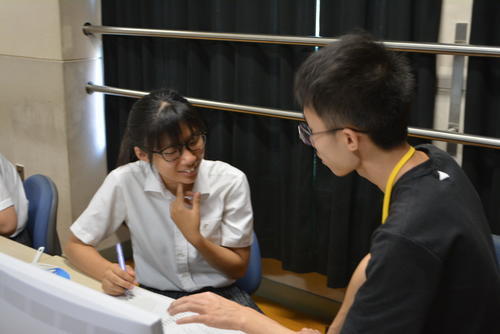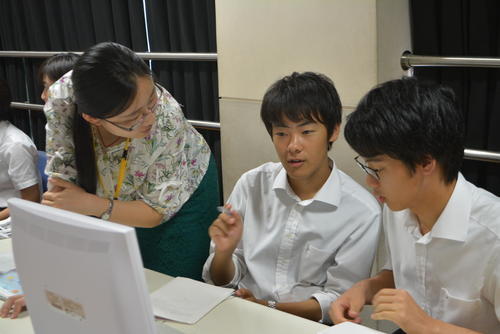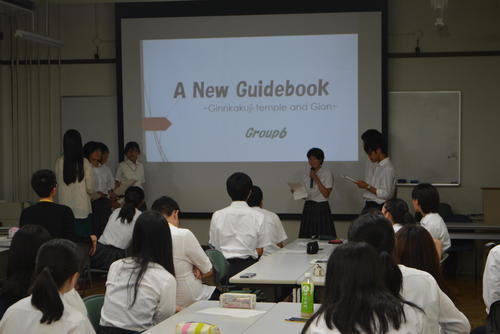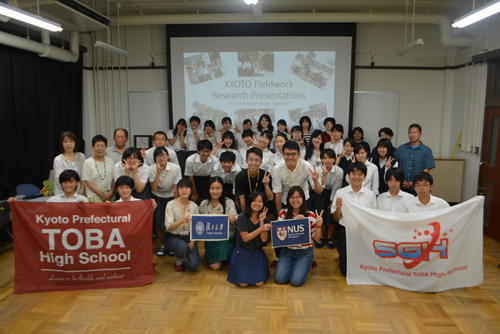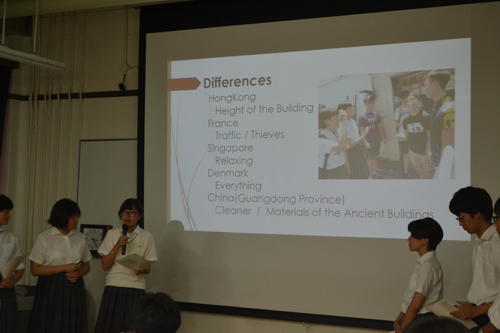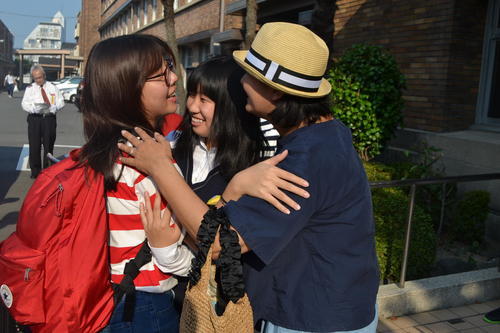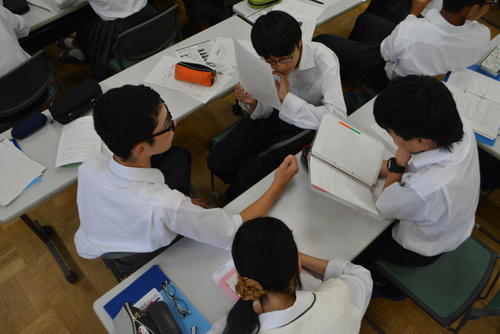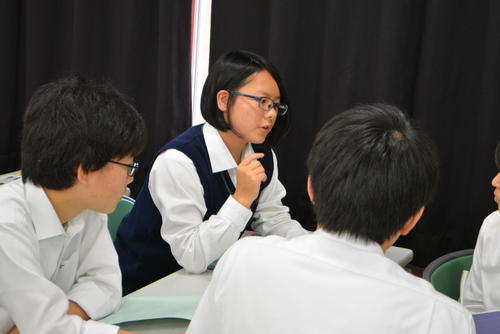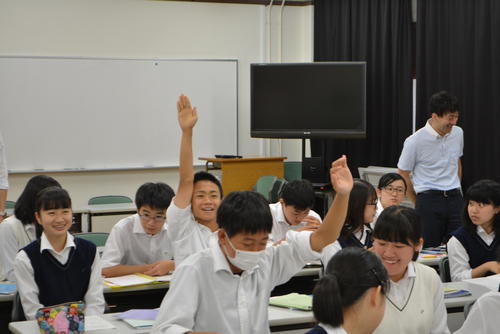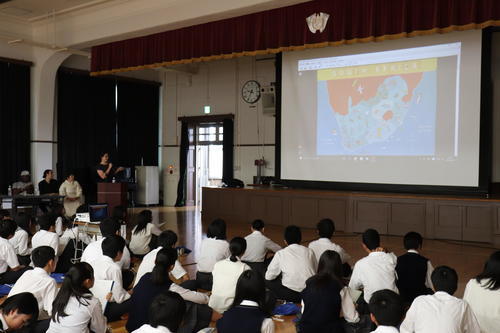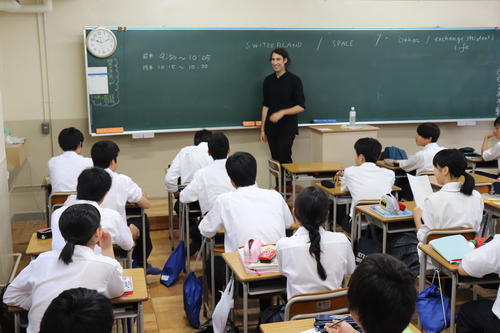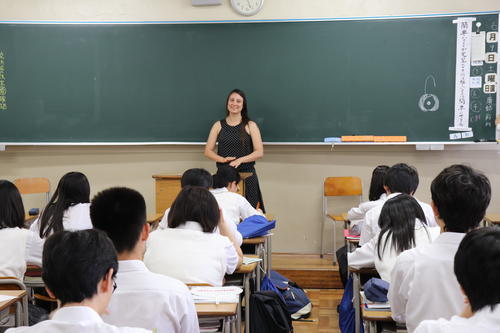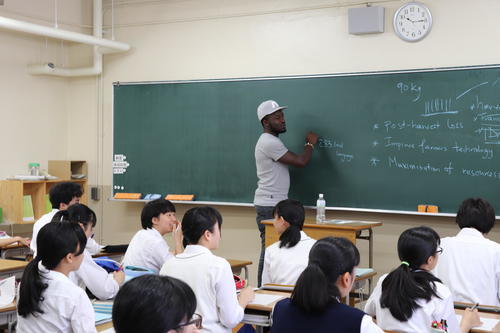英文サイト
ENGLISHHigh School Student Business Plan Gran Prix 2018/07/26
July 25 (Wed)
Today, ten first grade students and eight second grade students participated in a pre-entry lecture and workshop for the 6th Annual High School Student Business Gran Prix. It was run by Mr. Sakai Shunichiro, the Senior Director's Deputy of the Japan Finance Corporation Citizen Life Enterprise Kyoto Start-up Support Center. During the workshop, the students broke up into six groups and brainstormed business ideas. Over summer vacation, they will research and refine their plans and prepare them for entry in the contest.
Internship at Kataoka Manufacturing 2018/07/25
July 24 (Tue)
Today, 10 students participating in the SGH Study Tour to Korea and 10 participating in the SGH Study Tour to Shanghai took part in an internship at Kataoka Manufacturing. Mr. Kataoka, the president of the company gave a lecture on the outline of the company, its technology, and its approach to doing business. In the question and answer session, students asked him such questions as "What is needed to work as a global leader?" Afterwards, the students were given a tour of the manufacturing facilities, where they could see the latest high-tech laser technologies which are not normally open to the public.
During the Study Tours, the students will visit local branch offices of Kataoka Manufacturing in Korea and Shanghai.
HLAB Pre-Fieldwork 2018/07/24
July 23 (Mon)
Today two Toba first grade Global Course students joined three first grade students from Sagano High School to do pre-fieldwork for the HLAB Program, which will be held at the end of August. The students went to Arashiyama to check-out the course and the sites which they will visit with foreign University students. They were able to ask local staff about the damaged caused by the flooding of the river due to last week's heavy rains. It was a very hot day, but the students were able to carry out their mission successfully.
H30 Parliamentary Debate Practicum 2018/07/16
July 16 (Mon)
Today, ten ESS students participated in the H.30 First Parliamentary Debate Practicum. Two teams of second graders took part, while the first graders observed and helped with set-up and clean-up. After hearing a lecture from Professor Nakagawa of Osaka Prefectural University, the teams participated in two practice debates on the motions "Japanese high school students should do part-time jobs" and "Japan should accept more refugees." Each team lost one and won one match.
Toba Global Summit Day 5 2018/07/16
July 15 (Sun)
Today, on the final day of the Global Summit, the Fieldwork groups presented their findings. After preparing Powerpoint presentations in the morning, each group gave a presentation in the afternoon. The goal of their fieldwork was to find some new, interesting information that is not listed in the guidebook about the tourist sites they visited. One group was able to interview more than 70 foreign visitors. After the presentations, the homestay families attended a Farewell Ceremony and said good bye to the visiting University students.
The five days of 2018 Toba Global Summit were really exciting and meaningful for all the participants. Thank you very much to everyone who helped make it possible.
Toba Global Summit Day 4 2018/07/15
July 14 (Sat)
Today, thirty-one first and second graders joined the six visiting University students to participate in Kyoto Fieldwork. They broke up into six groups, each group going to tourist sites in different areas. The goal of their fieldwork was to find some new, interesting information that is not listed in the guidebook. The groups interviewed visitors in both Japanese and English and gathered information. In tomorrow's session, they will present their findings.
Toba Global Summit Day 3 2018/07/14
July 13 (Fri)
Today, after participating in classes in the morning, the six visiting University students were joined by 27 foreign exchange students from the Kyoto Exchange Student House and Kyoto Friendship Ambassadors. They participated in a two hour workshop for the third grade G Course students Innovation Studies III group research projects. After discussing their English research papers in detail, each group presented some suggestions for ways to expand, deepen or improve their conclusions. After school, the visiting students enjoyed having green tea and traditional Japanese sweets with the Tea Ceremony Club during the "Global Café."
Toba Global Summit Day 2 2018/07/12
July 12 (Thu)
The six visiting University students arrived this morning at school after spending the first night with their homestay families. In the morning, they participated in English and math classes. During the noon break, Toba students joined them for a "Global Lunch." They ate their lunches together and chatted. In the afternoon, they were joined by four students from the Kyoto Exchange Student House and participated in debates with the second grade Global Course students, as well as joining in an exchange during the first graders Long Home Room.
Toba Global Summit Opening 2018/07/11
July 11 (Wed)
Today four students from National University of Singapore (NUS) and two students from Fudan University in Shanghai arrived to take part in Toba's 2018 Global Summit, which will continue from today until Sunday, July 15th. The Summit, which is part of our schools Super Global High School (SGH) program, includes participation in classes and student research projects, as well as fieldwork with the students on the weekend. After the Opening Ceremony, the six visiting students were given a school tour by the ESS club, then met their host families at a Handing-over Ceremony.
After reading the comments from the exchange students, Toba students wrote some responses to them. Four representative responses are listed below.
It was difficult for me to translate waka(Japanese poetry) from Japanese into English because I don't find English words suitable for the image of the waka. Besides, I had never translated waka. But I realized once again how beautiful Japanese nature is. If there weren't four seasons, waka might not be created. So I want to spread the beauty of the waka to the world.
To write a tanka in English was very difficult because tanka have peculiar rhythm and expressions. But I was glad to read this message. I could understand that the tanka poetry party is very rare and wonderful.
Translating the poems was so difficult. English doesn't have the words I wanted to use. So I had to find suitable words. I took a lot of time to translate them. However, I'm very happy that you enjoyed and you were interested in the poems. I want you to enjoy them more.
I read these impressions and I'm glad because I feel that I was able to share the pleasure of Japanese poetry with foreign people. And I think that I'll continue to do my best at composing Japanese poetry and translating it.
Spring Poetry Recital Comments (5) 2018/07/02
Károlyi Orsolya (Hungary)
I really enjoyed the poetry event. I am studying classical Japanese poetry and translation, so I was very happy to see that there was also an English translation for each poems.
A lot of people see waka as a distant thing, and do not realize how beautiful it is. I hope you will continue to study these beautiful poems, and make the people around you realize how amazing they are. I have 2 advices for all of you.
(1) Make some easy explanations in Japanese too. Most of my Japanese friends does not have the slightest idea about classical Japanese, and for people like them (and they are the majority) it would be nice to have some easy explanations.
(2) Translating to English is really important, and the first step to share waka with the world, but there are a lot of people who can't speak English at all, and most of the people besides America, Britain and Canada only speak it as a second language. For them, it would be nice to have waka translations in other languages too.
I hope all of you will study a lot of other languages too, and spread the beautifulness of waka to the world.
Spring Poetry Recital Comments (4) 2018/07/02
William Giovanni (Indonesia)
Kyoto is one of the most famous city in the world for its own beauty. The city too, are popular for the traditionalism that kept for over decades yet still can felt until now. Not only the traditional culture, but also the world heritage such as local temples and shrines that located in over Kyoto. Because of those reasons, I came to Kyoto in order to enhance my knowledge and skill as an Architect, and as those reasons too, I got the opportunity to see the Utakai that held in Toba High School. Of course I am honoured to attend such an event, that not even the locals can see whenever they want.
The first impression of the Utakai is mythical. An ephemeral but enticing in my own humble opinion. Like the whole event only last for a split second as the song was started. From the song itself, I can find the traditionalism of Japan, as if the time flow back to the past, the old days of Japan.
Pretty much can be said that this kind of event need to be maintained, in order to conserve the traditional culture of Japan, and I believe it is wise to introduce such as this event to the locals, as I have been asked around to the generation of the Japanese, that pretty much on the same age, yet didn't know about this kind of events. That thing is a pity, remembering Kyoto is one of the Focal Point that is located in Japan, and it would be good if the tourist can feel the depth of culture, especially in Kyoto.
If I may conclude, the Utakai that Toba High School held is a very good thing in order to keep the culture of Japan intact and for the younger generation to remember their origin, because knowing one's origin is wise, everywhere, everytime, whoever you are.
Spring Poetry Recital Comments (3) 2018/07/02
Fitrianna Puspita Dewi (Indonesia)
First, I am very grateful to Toba High School who have given opportunity to foreign students like me to get to know Japanese culture and literature better. Although in University I learned a bit about Waka, but this is my first time to experience "Hikou". Through the Waka Recitation I can feel the coldness of the water or the wind breeze. I can imagine walking in the mountain, enjoying the greeneries, feeling calm and found my peace. For a moment I feel I am at Kibune or Takao. I came from a tropical country where summer is all around the years but I cannot find the beauty of summer. Summer for me is always identic with the sunburn, hot and humid weather, sweat and dark skin. But today, I`ve found the beauty of summer or Tranquility and peace in simple natural things like "dew drops on the leaves", "Crystal-Clear Water scooped with my hands", "Moonlight through the leaves" .And I also find more reason to preserve our nature, our water, our forest and mountain so we can always enjoy this beauty of nature. Lastly I really appreciate the spirit of Toba high school students to preserving traditional Japanese culture in the modern era as now, I hope this spirit is never disappear in Toba High School.
Spring Poetry Recital Comments (2) 2018/07/02
Jinwei Wang (China)
At first I worried about whether I could comprehend the performance as a foreigner, since the poems are written by ancient Japanese Poets. But the translations helped a lot and the solemn act and move of the performers helped me calming down. So when Kosho started to sing chorally, I forgot about being a foreign visitor, about the excitement visiting a high school in Japan, but began to image myself the peaceful scenes described in the poems, figuring myself walking under the moonlight in a summer night. If the essence of art is the replication of scenes and feelings, then the students of Toba high school successfully did it. Listening these poems is like taking a stroll through different scenes. By the clear voice of Koji, my thought was taken away from the assembly hall into the mountains. And the stretched tone of Kosho in a slow but steady tempo gave me enough time to wander around casually in each of these scenes. Although it was a hot summer day, by the voices of the students I felt the coolness of the summer night, the breeze blowing through pine trees and brook flowing under the tender moonlight. I am grateful for having such a chance to enjoy the wonderful performance and hoping it will be appreciated by more audience from other countries.
Spring Poetry Recital Comments (1) 2018/07/02
Today we received some comments from the five exchange students (three from the Kyoto Exchange Students House and two from Kyoto Friendship Ambassadors) who attended the Poetry Recital on May 29. You can read their comments below and in the next several posts.
Duygu Sahin (Turkey)
It was my first time attending such an event with poetry in Japan. So I was very excited to attend. Before the event, we received necessary information regarding the roles of each performer and the way the poems are cited. This made it easier to understand the scene, and follow the poems when read aloud. The rhythms and the musical tones were very surprising and new for me since our culture is completely different. Performers were well studied with their good voices. The clothes were dazzling as always. After the event, the explanation from Sensei and the English translations of the students helped a lot to uncover what is really being told. I really enjoyed the event and learned a lot about waka. I am now thinking of studying and enjoying waka more thanks to the students and the teachers. I find these cultural values to be always eye catching and interesting. They can be well preserved as well as get well integrated into the modern world which would put more uniqueness and taste to the plate. At this point, the interest of youth plays an important role. Moreover, being able to learn and perform these cultural values at young ages contributes to the way of thinking, seeing and doing things in a unique and elegant way integrating the past and the present. As an art enthusiast, I would love to see how this waka will evolve with the contribution of Japanese youth.
June 28 (Sat)
Today the first grade Global Course students took part in a workshop about Kyoto's Education and Kyoto's Industry. They discussed the importance of the topics in small groups, including some of the insights they gained from the Fukuchiyama University workshop in the previous session. While thinking about the current problems and future of Kyoto, they could also think about the various cultural treasures of Kyoto which they will focus on in their research projects.
June 9 (Sat)
Today in the Period of Integrated Studies, the first grade Academic Course students attended a lecture by Ms. Fujiyoshi Noriko and four exchange students from the Kyoto Exchange Students House. Ms. Fujiyoshi introduced some of the activities of the Kyoto House, and the students introduced a little bit about their countries. After the lecture, the exchange students joined in informal discussions with the students in their homeroom classes.
Poem Translation Challenge 2018/06/11
June 11 (Mon)
Today, the second grade sports classes (Class 1 and 2) and Global Course classes (Classes 7 and 8) took part in the Spring Poetry Recital. The Poetry Club students recited Japanese "waka" style poetry, just as it was done in the Heian Era. Kyoto Friendship Ambassador exchange students also attended. In order to help these students understand the poems, the participating classes tried translating them into English. The best ones were printed in the pamphlet for the event. Here they are, along with the Japanese:
道行けば松影の下にさざれ水夏をも知らぬ水無月の夜
Walking on the mountain path
In the shade of a pine tree
The babbling brook makes a sound
I forget the summer heat
On the June night
玉柏真清水ゆらす水の綾泉にうかぶ月ぞゆれたる
Brilliant drop
Falls in clear water
Causing ripples to spread
And rocking the moon
In the spring
手に結ぶ夏をも知らぬさざれ水清水の柏緑美(うるは)し
Water scooped with my hand
Its crystal-clear coldness makes me forget
Even it's summer now
And then I look up at the sky
There is only the beautiful green of an oak tree
月ながらせき入る清水風通ふ友とまどゐし夏の日くらし
On the summer evening
Moonlight coming through the leaves
Gentle flow of the clear water
In a lonely breeze
How I miss those days with friends
松影の岩井したたるま清水を手に結びてぞ夏を忘るる
A summer day in the forest
Spring water a boy found
Too cold
He forgets catching insects
Also being summer
June 9 (Sat)
Today in the fifth Innovation Studies I class, the students took part in a lecture and workshop by Associate Professor Sugioka and three Teaching Assistants from Fukuchiyama University. The lecture included detailed information about how to participate in fieldwork and workshops. Later, the students participated in an activity called "Global Café," in which they practiced interviewing the TAs.
Innovation Studies II Workshop 2018/06/09
June 9 (Sat)
Today second grade Global Course students attend a workshop by Professor Shindo and Specially Appointed Associate Professor Kakizawa from Osaka University. The workshop was entitled "What is good research?" They learned that good research has three requirements: (1) A clear goal, (2) Analysis of Concepts and Logic, and (3) Clearly defined research. The students will use what they learned in today in their group research projects.













